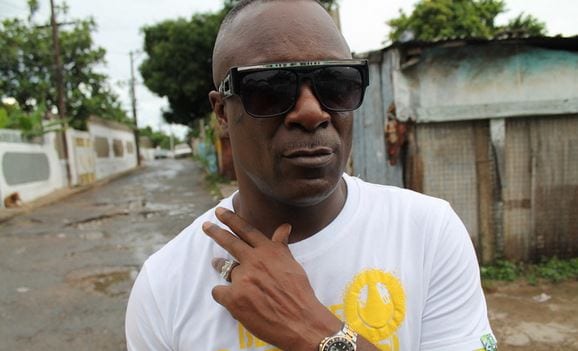Cutty Ranks Talks Early Life, His Surprising Connection To Gyptian, And Journey To Stardom

With unflinching candor, Cutty Ranks, the prolific Dancehall veteran who rose to prominence in the late 1980s, recently took fans on an exhilarating journey through his checkered past, revealing early run-ins with the law, shocking connections to some of Dancehall and Reggae’s greats, as well as the erratic nature of his rise to stardom.
Spilling the details via an interview on Teach Dem’s YouTube channel, the 58-year-old began with a tale of his origins – born to a father he has only seen once, and to a mother who ultimately abandoned him.
“When mi born my mother was living in Cassava Piece (Kingston), then, at three months’ old, she took me to a place named Bernard in St. Mary,” he shared.
After living in the rural area for a while, around age eight, he ran away from home and found himself in the busy streets of the nation’s capital – Kingston.
“When mi was around eight or nine, mi did rude enuh. Bad. Mi did deh a street. Run weh from mi yaad and all dem ting deh,” Ranks, whose real name is Philip Thomas, explained. It wasn’t just once either. Ranks alluded to multiple instances on that front, before revealing that his mother left him with an elderly couple – and he wouldn’t see her again, not until he was around 18.
While that eventual search for her years later via her school records led him to Manchester, where he discovered siblings and other family members he hadn’t met, his father wouldn’t resurface after their rather brief introductory meet.
“Last time mi see my father, I was around 10. Him gimmi a brief, a marina and $1.50, and mi nuh see him since,” Ranks said.
With both his biological parents gone, Ranks found a home in the elderly couple he was left with. He explained: “A she mi call my grandmother. We nuh biological (related by blood), but she and her husband raise mi.”
He added: “She and her husband put up wid a lot wid mi. Good or bad. She used to go Pentecostal church, so dat a how mi grow up.”
Cutty Ranks: The Runaway, And How He Got His Name
Despite the safety of his newfound family and an upbringing rooted in the early church, Ranks couldn’t quite shake the allure of the streets. He would run away from home – and school – again, and this time ended up back in St. Mary.
As he tells it: “Mi used to rude… mi nuh toe line. Mi lef and stray until mi reach inna High Gate, St. Mary, and a deh suh mi go live wid some friends until mi start school again. Mi even did start go JAMAL.”
JAMAL is the now dissolved Jamaica Movement for the Advancement of Literacy – a program established in 1974 by then Prime Minister of Jamaica, Michael Manley, to combat adult illiteracy. Even then, Cutty Ranks was unimpressed. The streets, yet again, called his name. And, like all the times before, he answered, leaving everything behind.
“Mi get fed up a dem (friends and school) and so mi get [back] inna di streets,” he said. In retrospect, Ranks revealed, the streets were good to him.
“Mi used to sleep downtown (Kingston) inna stall, mi used to deh all bout. And, di streets neva deal wid mi too bad.” In fact, Cutty Ranks believes, the streets played a major role in the successes he would go on to reap. “A di same people from di streets elevate mi. Dem same one a di fans – from Jungle, Spanglaz, Matches Lane… all a dem support mi.”
The streets are where Cutty Ranks would earn his name, as well as a few trips to prison – one of which was for almost killing a man. That doesn’t happen, though, without first understanding the insatiable appetite for work that possessed Cutty Ranks. It was in matters related to work, after all, that he knocked a man out with a bottle of rum, and immediately came to believe that he had killed him.
That short-temperedness would also give rise to the name ‘Cutty’. Contrary to the prevailing belief that he had gotten the name because he had been a butcher, its origin is actually rooted in violence. He explained: “Mi used to fight whole heap innuh. A suh mi get di name ‘Cutty’ – mi used to cut man. One time a man try get aggressive wid mi – a try extort mi, and is a butcher knife reach him. Mi used to fight a lot.”
The man who once sold oil and rice in down town, West Kingston, Cutty Ranks, worked a number of odd jobs. Things would change, however, after he sharpened his skills as a butcher.
“Mi eventually learn mi way round a meat shop, and even do construction and dem ting deh,” he shared, showing Teach Dem his calloused hands. In the first of those two gigs, Cutty initially started as a fridge cleaner, and even then, he found a hustle out of it. “Mi used to bag up some big blocks a ice and di boss wouldn’t mind, because all him used to see was di ice.”
Those blocks of ice, Cutty revealed, would have frozen pieces of meat inside, and he’d eventually pry them out and find someone to store them for him. Eventually, he had gathered enough – and continued to, to the point where he became a meat-seller. Then, the unimaginable happened.
“Mi trust some man down town some meat,” Cutty explained, “but every time mi go fi collect mi money, him used to tell mi fi come back next week. Every time. But one day, mi decide seh mi nah ‘come back nex’ week.”
Determined to get his due, Cutty confronted his tardy customer. “Mi tell di man seh mi want mi money, but den dis bwoy – it look like him work inna di man place – a come tell mi bout mi fi come outa di man place. How him come in a dis?”
Seemingly annoyed that the man had attempted to foil his efforts at getting monies owed to him, Cutty saw a shot and took it.
“As di bwoy tek him eye offa mi, is a quarter bottle a rum mi use and knock him inna him head, knock him out. Him drop ‘boof’!”
Cutty immediately fled the scene, fearing that the now bloodied and unconscious man had died. For two months, after escaping that harrowing scene for the countryside, the would-be artist would live among the bushes. “Mi run weh go a country guh hide a bush fi bout two months.” There, Cutty would find the unlikely start to his professional career.
A New Life
He had found himself in a place called King Weston, St. Andrew.
“A up deh suh mi get fi go pon di sound [system] mic… waa sound name Rebel Tone. Afta dat, mi move to a sound name Feather Tone,” Cutty Ranks explained. Coincidentally, he revealed, both sound systems belonged to close relatives of Windel Beneto Edwards – the Dancehall star we would come to know as Gyptian. Rebel Tone was operated by a cousin of the future star, while Feather Tone was operated by Basil Edwards.
Ranks found work there as a sound box loader, moving around the large sound boxes as needed.
After some time had passed, the future deejay decided it was safe to return to Kingston.
“When mi reach back a town, couple man tell mi seh di yute still alive.” His relief was short-lived when he was swept up by the police, and was imprisoned at the Crossroads Police Station, as he described, “for a while”.
There, Cutty not only honed his deejaying skills, but dominated his fellow inmates. In fact, the veteran deejay admitted that his career as an artist truly started there. “A deh suh di music start,” he revealed. “When mi used to deejay inna jail, it used to be like clash – like some big stage show. Inna prison, mi used to win off anyting and everyting.” At one point, he explained, he won five cartons of cigarette, and everybody who needed a smoke came to him.
That stint of Cutty Ranks’ see-saw relationship with the law came to an end when he was bailed out by an old boss. He remained a free man after he was given a proposition by the man he had hit, who showed up at one of his jobs – 500 Jamaican dollars and he wouldn’t show up to court.
“Dem time deh 500 dollars was like 500,000 innuh,” Cutty explained. “Mi neva have it, but mi hustle half a it and send go gi him. Den mi send him a nex’ 100 after a while. Di case did jus gwaan till him stop show up a court and it get throw out.”
Just Music
From that point forward, music would be Cutty’s primary focus.
Drawing inspiration from musical greats like the legend, Bob Marley, Daddy U-Roy – whom he described as one of his biggest influences, Josey Wale, Charlie Chaplin, Burning Spear and Joseph Hill, the prolific deejay was determined to make an impression. That’s why when his boss approached him one day to follow him to a party to perform, he didn’t hesitate.
“Yuh always a sing inna di market. Mi ago see wa u mek of,” his boss said. The challenge was clear, and it was one he had been eager to meet. Explaining that the party had been in the “hills”, Cutty shared: “Ay, mi go up deh and slap up some lyrics yuh see! Dem did love it!”
From then on, Cutty became a relentless journeyman, seeking out sound system microphones that would afford him a platform, as well as opportunities to showcase his skills.
“Mi go a waa sound name Upsetter,” Cutty shared. “Afta dat, mi guh look mic pon Gemini Sound System, and even though mi did a lift sound box fi dem, dem neva waa gi mi no mic.”
At the time, Gemini Sound was one of the biggest sound systems in Jamaica. It featured trailblazers like Johnny Ringo, Welton Irie, Archie, and Squddly Ranking, and, according to Cutty Ranks, “even Barrington Levy and Linval Thompson come through at points.” He continued: “Dem time deh mi still a lift di sound box dem though.”
Without much luck at Gemini, after still not getting the privilege to be on the mic, he hunted down a spot on the Kilamanjaro Sound System, which was being managed by Early B, Dutty Harry, and the legendary Super Cat.
Cutty had learned of a party the popular sound system would be at, and decided that would have been his chance. For a brief moment after he found them, there was some spark of optimism.
“Mi hear dem seh ‘Come in Cutty Ranks!’” Believing his time had come, the eager deejay made his way to them, but was soon disappointed. “Mi think a mic dem a call mi fa. When mi reach, a food dem a send mi fi guh buy.”
It wasn’t all for naught though. “A when dance almost done mi always a get mic. A so mi start get a shot offa di mic and so comes mi get mi real practice. Dem only a gi you di one drop riddim weh u affi ride. After a while, mi get used to dem and start ride dem like bicycle.”
Back On The Mic
That chapter of Cutty’s relentless pursuit brought him back to Gemini Sound. Unfortunately, it also brought him back to loading sound boxes primarily.
One day, he had seen enough. Cutty waited for an opportunity, while there at Gemini, and seized the mic.
“When mi tek up di mic, di people dem tek up some fine gravel and seh ‘A wa yaa do ya suh? Yuh can deejay?’ and fling some gravel offa mi. So, mi affi put dung di mic and lef it.” What happened next for the aspiring artist could not have been scripted any better.
He explained: “Mi jus’ go bun a spliff. Mi drink two bottle a Red Label Wine to, and mi charge up and go back up deh.” Gravel or not, Cutty had decided it was do or die. “Mi hold di mic… Yuh see when mi start fling lyrics? Di people dem beat out every zinc roun a dat!” His brazenness paid off in sweet triumph, and word of his daring stunt – and subsequent wild success – began to spread.
Cutty again left Gemini Sound a while after, revealing, among other things, that there was no love lost between himself and the heads of Gemini. “Dem [Gemini] was a wicked,” he said, adding that despite the amount of traffic he began to pull, he was still only being paid 20 dollars per week to load sound boxes.
Following the close of that chapter, Cutty Ranks met Puddy Roots – the man he credits with giving him his “first real break.”
While hanging out one day, Cutty said he was approached by Puddy Roots and some acquaintances.
The Birth Of A Star
“Dem seh dem want mi fi deejay pon Stereo Mars in a clash against Cosmic Force, and dem also ask mi how much mi did want fi do it.” Caught off guard by the question, Cutty Ranks explained that for the first time in a while, he was hesitant. No one had ever asked him how much he wanted.
“A man usually gimmi a ting so mi stutter. Memba seh a $20 dollars a week mi used to get innuh,” he explained. Faced with the first opportunity to name his price, he froze before reluctantly offering up an answer.
“Big and serious, mi nah move fi less dan $150 JMD innuh.” To his surprise, they agreed. Cutty Ranks later learned that his asking price wasn’t as egregious as he had feared. Guru Banton, who had been approached with the job, had asked for $800 dollars, and, “…if mi did know seh a dem money deh dem man deh did a charge, mi woulda ask fi 400 hundred. A big, big money dat.”
Still, at the time, $150 dollars was a lot of money. Cutty Ranks accepted it, and made his way to Paisley – where the clash would be held.
“When we end up a Paisley, mi hear seh a Papa San and General G ago deh pon Cosmic Force and mi seh ‘Nah man, we (himself and Ricky Tuffy) affi go plan something fi dem ya bwoy deh.” And that he did.
Instead of trying to go toe-to-toe with those juggernauts, Cutty Ranks decided to play the crowd. He learnt that Paisley was a PNP stronghold, and he would be playing to earn that base’s favour. “I wanted to win by any means necessary.”
When the dust settled, after he had blindsided the opposition with a few PNP-flavored lyrics, Cutty Ranks emerged victorious over Papa San and General G – and had gun salutes, beaten out windows and a near deadly standoff with a man whose gun was drawn to prove it.
The legend of Cutty Ranks grew even greater after that moment.
He reminisced that his performance at that clash was worlds away from the time he had entered the Tastee Talent Show, where he had crumbled before the crowd with stage fright. “I tell myself seh neva again would I allow dat to happen. And it didn’t,” he said. His victory was proof that he had overcome that fear, and the people of Clarendon recognized that too. They insisted that he stayed with Stereo Mars, so he was there for a “very, very long time.”
Pretty soon, Cutty Ranks explained, he began to truly make a name for himself. “Mi start mek mi name a di countryside. Places like Clarendon, Mandeville, MoBay, in Sam Sharpe Square – people start know Cutty Ranks.”
Though he had grown massively under Stereo Mars, and after several trips overseas, Cutty Ranks would leave that outfit, due to unexplained circumstances, to further pursue his career years later.
Rise Of The Bomber
Then, in 1989, The Bomber – arguably Cutty Ranks’ biggest hit – was recorded.
“Mi record ‘Bomber’ inna 1989 but Penthouse Records did a siddung pon di song like a souvenir.” So, Cutty Ranks took things into his own hands. A producer by the name of Patrick Robertson had opened a studio next door, and Cutty Ranks went to him and recorded ‘Bomber’. Shortly after, it was released to widespread acclaim.
“Bomber a di chune weh buss mi inna Jamaica. People used to seh mi a iron balloon – dem used to seh mi cyaa bus. So, mi boom up di balloon wid Bomber…” Cutty Ranks joked.
Penthouse Records, who had originally recorded the hit, was not a fan of Cutty’s actions.
“Dem confront mi ‘bout voicing the song for Robertson, but luckily, when dat did a happen, Beres Hammond happened to be in studio.” It was the Reggae crooner who came to his defense. “Beres seh to dem, ‘Di yute neva voice di song fi you and you siddung pon it like you have it up at Hope Road Museum? Wa yuh need fi do, instead a cuss di yute, ask him fi voice another song.”
That idea gave birth to Cutty Ranks’ next hit, Pon Mi Nozzle .


